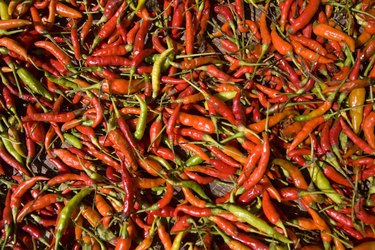
Cayenne pepper is a chili pepper that belongs to the nightshade family of plants, which includes paprika, tomato and eggplant. The peppers are dried and powdered and used to make hot sauces and add spicy heat to foods, such as Buffalo-style chicken wings. Because cayenne contains a chemical with analgesic properties, it is used topically to relieve nerve and muscle pain. Cayenne is also used internally to stimulate digestion. Eating too much, however, might cause stomach problems.
Heat Factor
Video of the Day
The heat of chili peppers is measured by the Scoville scale, which ranges between zero and 16,000,000 units. According to Richard L. Myers, author of "The 100 Most Important Chemical Compounds: A Reference Guide," the heat index of cayenne is between 30,000 and 80,000 Scoville units. To put this into perspective, consider that jalapeno rates between 3,000 and 8,000 units of heat.
Video of the Day
Chemical Composition
The heat capacity of chili peppers actually represents a measurement of capsaicin, the active ingredient in cayenne. The "Physicians' Desk Reference for Herbal Medicines" says that cayenne contains up to 38 percent capsaicin, which is described as anti-inflammatory, antimicrobial, analgesic and gastroprotective. This compound also causes a burning sensation on contact.
Physical Effects
Capsaicin exerts analgesic effects by depleting neuropeptides, specialized protein molecules that bounce between nerve cells and signal the perception of pain in what is known as the nociceptive response. A study published in the August 2011 issue of the "British Journal of Pharmacology" reports that this effect is driven by the activation of certain capsaicin receptors, such as transient receptor potential vanilloid 1, or TRPV1. When capsaicin binds to TRPV1, a calcium channel opens that stimulates the release of more neuropeptides like substance P. Unlike oral antagonist analgesics that systemically block TRPV1 activity, capsaicin activates TRPV1. With repeated exposure, however, nerve fibers become desensitized, which relieves pain but without dulling the sensation of touch. In the gut, though, capsaicin may increase gastrointestinal peristalsis and the risk of stomach irritation, ulcers, diarrhea and chronic irritable bowel syndrome.
Potential Gastrointestinal Effects
According to the "Physicians' Desk Reference for Herbal Medicines," ingesting capsaicin has been shown to protect the stomach from aspirin-induced damage. However, the University of Maryland Medical Center says that capsaicin also increases the production of stomach acid, which is problematic if you have a history of peptic ulcers.
Side Effects and Warnings
Because capsaicin increases stomach acid, eating a lot of cayenne pepper will reduce the effectiveness of prescription and over-the-counter acid reducers. Talk to your doctor about your intake of cayenne if you take asthma medications, ACE inhibitors or blood-thinning drugs, as there may be potential side effects, including the risk of bleeding. The University of Maryland Medical Center explains that while eating foods with cayenne pepper is safe during pregnancy, you should not take supplements. Cayenne will also pass through breast milk while you are breastfeeding, during which time you should not use cayenne as a supplement or a spice.